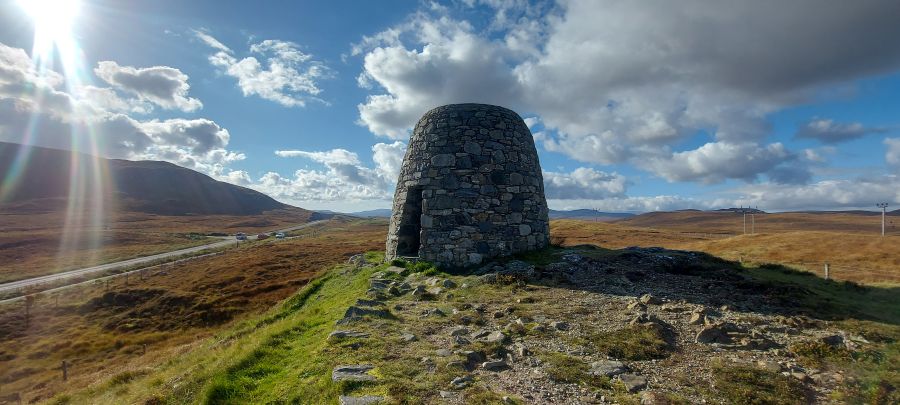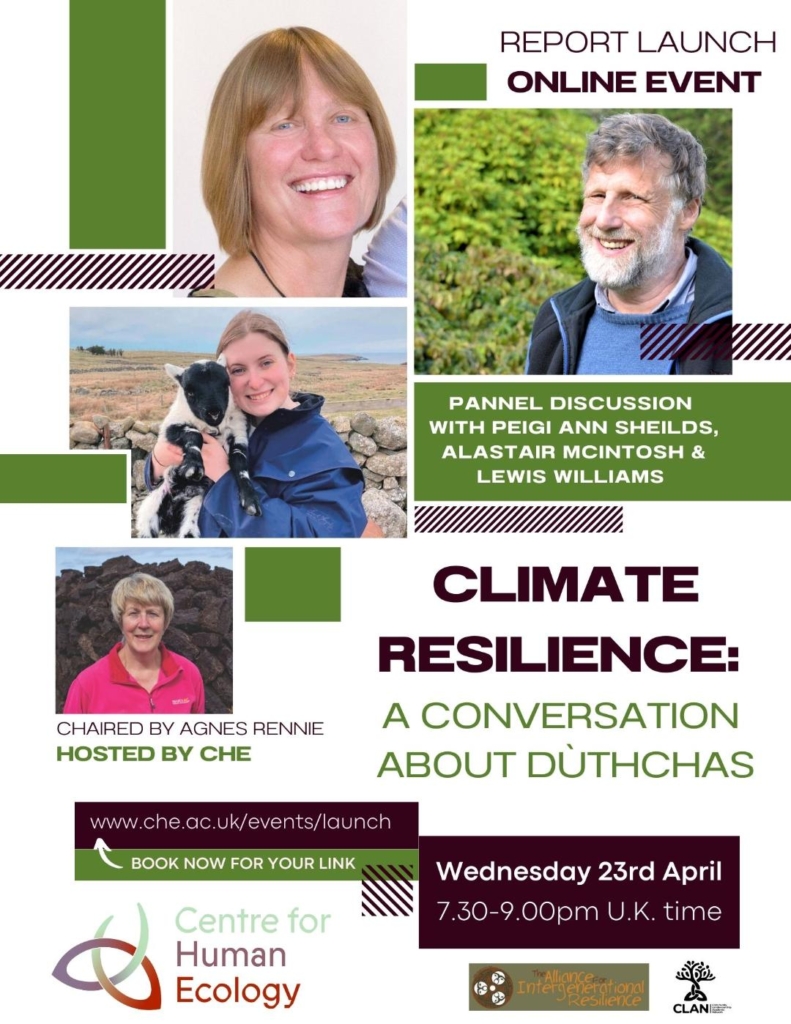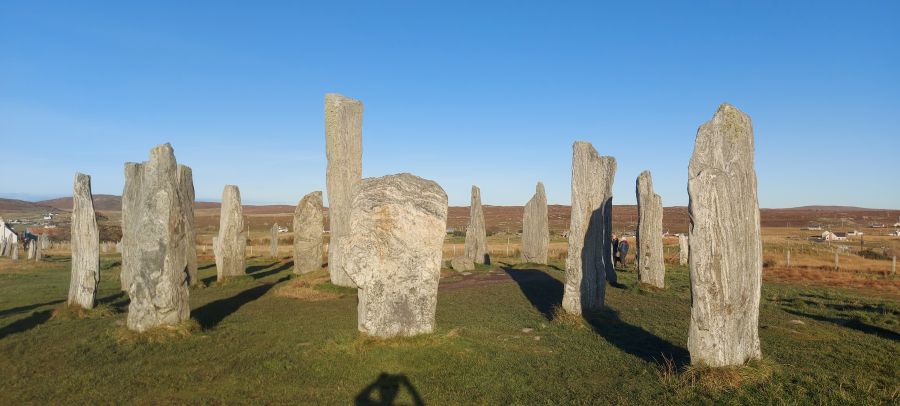Climate Resilience: A Conversation about Dùthchas
“My soul is entwined with the land, and that is the way I see the world”
– Peigi Ann Shields
“When people get their land back, the connection to place becomes fundamental.”
– Alastair McIntosh, Leòdhas & Govan, Glaschu.
In these times of societal transition in the midst of immense human and planetary challenge and suffering, one of the wisest things we can do as communities is to dig deeply for our ancestral knowledges and traditional lifeways – bringing these forth in ways which hold both time-sustained and new relevancies for this era.


Memorial to commemorate the Pairc Land Raids, Pairc, Eilean Leodhais
This is the subject of an upcoming panel this week to be hosted by the Centre for Human Ecology, based in Govan, Glasgow. This intergenerational and international online panel will bring together Eilean Leòdhais (Isle of Lewis) natives Peigi Ann Shields (from Bragar on the West side of Lewis), Agnes Rennie (from Ganhsann in the north of Lewis), and Alastair McIntosh who through his father has Gàidheil ancestry, growing up on Lewis from the age of four. They will be joined by myself, who as someone from Aotearoa / New Zealand brings both my Mȃori (Ngȃi Te Rangi) and Gàidheal (Eilean Arainn) ancestral lineages to the table.
The Centre for Human Ecology gives this context to the event and the report:
“The human-planetary challenges confronting us today – global warming, rampant capitalism and extractivism, displacement and cultural dislocation are causing many of us to search deeply for what climate and cultural-ecological resurgent work looks like in these times. How do we strengthen climate and cultural resilience and how do we ensure Indigenous Knowledge is part of this? In the Gàidhealtachd (the Gaelic speaking Highlands and Islands) and in the communities beyond it, the Gàidheil Indigenous concept of dùthchas – a deep interconnectedness with the land, one’s community, collective cultural memories and the basis for traditional ecological knowledge – has been at the centre of many conversations.”
“In celebrating the launch of “Dùthchas agus dualchas an saoghal nan Gàidheil


There can be no doubt that the scars of colonisation are viscerally embedded across the Gàidhealtachd. The Clearances saw thousands of Gàidheil forced from their Indigenous homelands with many either flushed out to the Scottish Lowlands or becoming part of the Gaelic diaspora in countries such as New Zealand or Canada.
For the Indigenous communities that remain in the Gàidhealtachd today, the new colonial culture just keeps coming – whether it’s corporate renewable energy takeovers, or the threat of further land dispossession – it’s relentless. Yet Gàidheil communities are also resisting, renewing indigenous lifeways in ways that hold newfound relevancies for today, particularly in light of the significant cultural, environmental and economic issues facing Hebrideans today.


Callinish standing stones
We will talk about the quiet and ongoing trauma experienced by many Gaels, the imperialist legacies that Gàidheil must confront in moving forward, Indigenous language loss and the politics of land revitalization today, the renegotiation of Gàidheil and Indigenous identities, including meaningful newcomer belonging and the renewal of rituals for intergenerational knowledge transmission and reengagement with time honoured concept of dùthchas. Our discussion will include resonances between Mȃori and Gàidheil worldviews as well as how descendants of settler Gàidheil living in Turtle Island/Canada and Aotearoa/New Zealand can draw on the knowledge of their own colonization and past ancestral lifeways more meaningfully in terms of meeting their own obligations as Treaty People.
Climate Resilience: A conversation about Dùthchas
Online via Zoom, 1930-2100 UK time, Wednesday 23rd April 2025
The Centre for Human Ecology and the Alliance for Intergenerational Resilience are pleased to invite you to this upcoming online report launch and panel discussion. Join us for what promises to be an insightful and timely event.
Download the report here: https://www.che.ac.uk/wp-content/uploads/2025/04/Gaidheal-Resurgence-30Mar.pdf
Register to attend the event here: https://www.eventbrite.com/e/climate-resilience-a-conversation-about-duthchas-online-report-launch-tickets-1316105479919

Sounds interesting but there are dangers in people claiming “a deep interconnectedness with the land”, not least in current violent ‘recolonising’ movements and irredentism in general. Humans have colonised the planet, as well as defaced and degraded it. Were the lands of the Gaels scarred before the colonisation by the Otherly-Speaking? Were there already cautionary tales in Gaelic about lands sickening, waters losing their thronging vitality?
In other words, is it almost certain that the concept of dùthchas was hard-learned, through making the same kinds of mistakes (committing the same kinds of atrocities on the living planet) that later colonisers are justly charged with?
The 3d world being created today undermines the spirit of humanity and its relation to ouur home world in every corner of that world.It os a dividing rift .it is to the children that out attention must focus so that they do not get lost or misdirected,that they retain the wisdom of the ‘elders’ in the widest sense of the word.it is heartening to know such things are being discussed.